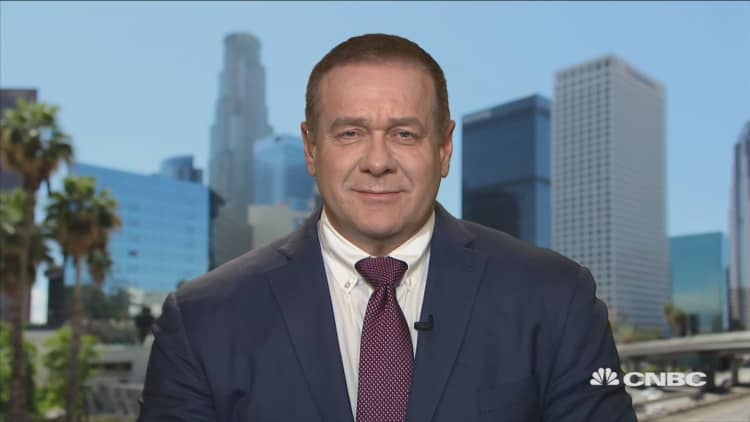
Guggenheim's head of investing sees a tough road ahead for the market and economy, with a sharp recession and a 40 percent decline in stocks looming.
Scott Minerd, who warned clients in a recent note that the market is on a "collision course with disaster," expects the worst of the damage to start in late 2019 and into 2020.
Along with the decline in equities, a rise in corporate bond defaults is likely as the Federal Reserve raises interest rates and companies struggle to pay off record debt levels.
"For the next year ... equities will probably continue to go up as we have all these stock buybacks and free cash flow," Minerd told CNBC's Brian Sullivan in a "Worldwide Exchange" interview. "Ultimately, when the chickens come home to roost and we have a recession, we're going to see a lot of pressure on equities especially as defaults rise, and I think once we reach a peak that we'll probably see a 40 percent retracement in equities."
(Editor's note: Video above is an extended interview with Minerd, including parts exclusive for the web and not aired on "Worldwide Exchange".)
One of the main problems is that Congress and President Donald Trump have pushed through aggressive fiscal policies at a time when the Fed is looking to control growth with higher interest rates and less accommodative monetary policy.
Corporate debt currently stands at a record $8.83 trillion, according to Securities Industry and Financial Markets Association data. Higher rates will make it harder for companies to refinance and will put pressure on them once the stimulative effects of tax cuts wear off, Minerd said.
Once short-term rates hit 3 percent, that will be enough to drive up defaults and cause a recession, he added.
"As interest rates keep ratcheting higher, with record levels of corporate debt it's going to be harder and harder to service," Minerd said. "At some point, as the economy starts to mature and as cash flows start to stabilize and decline, it's going to be difficult for everybody to pay this interest."
"Defaults are going to be concentrated in corporate America, where in the past downturn they were basically focused in areas of consumer activity," he added.
From there, Minerd figures the Fed will get involved, going back to the quantitative easing policies that helped pull the economy out of the last recession and pushed a surge in stock market prices but also coincided with lackluster economic growth.
"All that will do is defer the problem into the future and allow excesses to continue to build and the collision course that we're on will just come later and probably be worse," he said.


